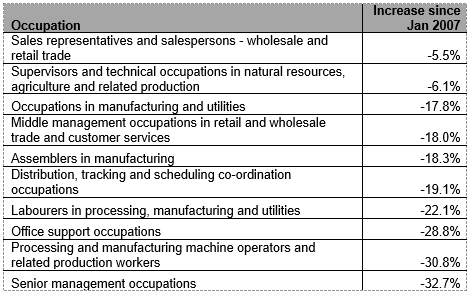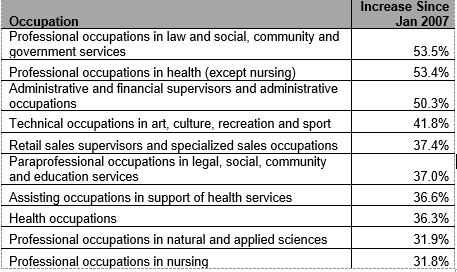Remember when everyone was freaking out because there were too many sociology graduates and not enough welders? When otherwise serious people like Ken Coates complained about the labour market being distorted by the uninformed choices of 17-19 year-olds? 2015 seems like a long time ago.
Just for fun the other day, I decided to look at which occupations have fared best and worst in Canada over the past ten years (ok, I grant you my definition of fun may not be universal). Using public data, the most granular data I can look at are two-digit National Occupation Codes, so some of these categories are kind of broad. But anyway, here are the results:
Table 1: Fastest-growing occupations in Canada, 2007-2017
See any trades in there? No, me neither. Four out of the top ten fastest-growing occupations are health-related in one way or another. There are two sets of professional jobs – law/social/community/ government services (which includes educational consultants, btw) and natural/applied sciences) which pretty clearly require bachelor’s if not master’s degrees. There are three other categories (Admin/financial supervisors, Technical occupations in art, and paraprofessional occupations in legal, social, etc) which have a hodgepodge of educational requirements but on balance probably have more college than university graduates. And then there is the category retail sales supervisors and specialized sales occupations, which takes in everything from head cashiers to real estate agents and aircraft sales representatives. Hard to know what to make of that one. But the other nine all seem to require training which is pretty squarely in traditional post-secondary education specialties.
Now, what about the ten worst-performing occupations?
Table 2: Fastest-shrinking Occupations in Canada 2007-2017

This is an interesting grab bag. I’m fairly sure, given the amount of whining about managerialism one hears these days, that it will be a surprise to most people that the single worst-performing job sector in Canada is “senior management occupations”. It’s probably less of a surprise that four of the bottom ten occupations are manufacturing-related, and that two others – Distribution, Tracking and Scheduling and Office Support Occupations – which are highly susceptible to automation are there, too. But interestingly, almost none of these occupations, bar senior managers, have significant numbers of university graduates in them. Many wouldn’t even necessarily have a lot of college graduates either, at least outside the manufacturing and resources sectors.
Allow me to hammer this point home a bit, for anyone who is inclined to ever again take Ken Coates or his ilk seriously on the subject of young people’s career choices. Trades are really important in Canada. But the industries they serve are cyclical. If we counsel people to go into these areas, we need to be honest that people in these areas are going to have fat years and lean years – sometimes lasting as long as a decade at a time. On the other hand, professional occupations (nearly all requiring university study) and health occupations (a mix of university and college study) are long-term winners.
Maybe students knew that all along, and behaved accordingly. When it comes to their own futures, they’re pretty smart, you know.


 Tweet this post
Tweet this post

This analysis only covers half the picture.
In addition to understanding growing and shrinking occupations, the second factor to consider is attrition in occupations, largely due to retirements and other departures from the workforce. The occupations with the oldest average age also tend to be the most punishing on the physical health of workers. These days the attrition factor is often a larger contributor to forecast job vacancies, especially in many of the skilled trades and professional/assisting health occupations. And, for the health sector jobs, that’s a double whammy.
C’mon, I gotta keep some stuff in reserve for future blogs!
Attrition? No. I don’t believe attrition will produce the job deficit predicted. 15 years ago they predicted a teacher shortage in BC because of attrition. Guess what happened? Teachers worked past standard retirement age and they didn’t replace all of the ones who retired. This is beginning to happen in other jobs too. People are working longer, or coming back part time when retired, or the jobs just aren’t being replaced. Growth is a much better force than attrition.
So, the number 1 job category over the last 10 years was the one for “sociologists”.
Who knew.
This makes a strong case, and I’m glad to see it being made.
I should think that this is also partly explained by something like psychology, or maybe culture. Training in trades and jobs in trades share the same name: the cause-effect logic of getting a welding ticket and a welding job is easier for a lot of people, including Coates, to grasp, than the general benefit of a liberal education.
Secondly, predicting where the jobs will be is crystal-ball stuff. The best response isn’t to try to develop better models, but to try to provide the sort of all-round education which allows students to take up different skills, as their interests and the demands of the market might dictate:
“the man who has learned to think and to reason and to compare and to discriminate and to analyze, who has refined his taste, and formed his judgment, and sharpened his mental vision, will not indeed at once be a lawyer, or a pleader, or an orator, or a statesman, or a physician, or a good landlord, or a man of business, or a soldier, or an engineer, or a chemist, or a geologist, or an antiquarian, but he will be placed in that state of intellect in which he can take up any one of the sciences or callings I have referred to, or any other for which he has a taste or special talent, with an ease, a grace, a versatility, and a success, to which another is a stranger.” (John Henry Newman).
Thank you, Sean Lawrence, for sharing John Henry Newman’s quote. I took a bit of creative license on another of his:
To live is to change, and to IMPROVE is to have changed OFTEN Lifelong learning in today’s GLOBAL ‘Monet’ Economy is a MUST!